Books of 2016
01. Broken angels - Richard Morgan

Richard Morgan is the only author whose books I try to read twice. I had read “Broken angels” more than five years before and apart from a very few scenes I remembered next to nothing. Follow up to “Altered carbon” with Takeshi Kovacs in a planet far away from earth in a totally different adventure (no spoilers). Tough but rewarding page turner. Wanted to read so much that I was just devouring it, missing less details of the story than the first time and possibly more than the third if there will ever be one.
The universe of the Kovacs trilogy is unique in it’s world building although a “proper” dystopia, Moran makes me want to be in one of it’s planets for a while. Difficult to digest the concept of “re-sleeving” but while writing these lines my head is is still full of futuristic weapons, interstellar travel, Marian spaceships, private armies, religious fanatics, cloak and dagger betrayal, corporate executives and so many other things on which I will try not to dwell so that I will not reveal any details of the plot. I really liked the fact that it’s plot is set somewhere far away from planet Earth which I usually treat as an short-cut from building a good science fiction world, something that many books suffer from with the previous one “Altered carbon” of course excluded.
On the topic of comparing it with “Alter…” many people found this one somehow inferior mostly because some of their favourite elements from that one are not here. I found both books on the same level. I would really favour this one, if I had to choose between the two, without pushing myself to do so because I am a fan of the author. The first book had elements and a plot that appeal to a wider audience, with the second one appealing more to people that enjoy the specific genre be it science fiction or cyberpunk or dystopian future whatever.
Third and last of the series, “Woken furies”, will have to wait for a prolonged period of free time such as a holiday, since it’s size scares me.
Links:
- Author’s book page,
- Goodreads,
- Wikipedia - summary of the plot.
02. DO/Story/ “How to tell your story so the world listens” - Bobette Buster

Was lucky enough to listen to a speech from the book’s author at the end of last year on which I could get a “How to tell…” copy for my to-read list, which I am currently cleaning up. Hope was to assist in improving my writing.
“How to tell…” is an introduction/tour to the art of story telling from a Hollywood-ish angle. Useful as I decided to use the suggested exercises and suggestions for my own writing and blog posts. Book is small in size but packed with the mechanics of story telling, flavoured with stories from the author’s and her students’ lives as well as from memorable films.
Might check out other books from the same series as the size/utility ratio is intriguing.
Link: Company’s book page
03. Getting past no - William Ury
This one was a gift that ended up on my “to read” stack, because of an interest that I had expressed in negotiation literature. I started reading it in order to look cool to the person who gave it to me, but luckily I got hooked.
In the first chapters Ury discusses on what you should never do when negotiations go south. It was essentially an enumeration on what I was doing before in the similar occasions so that grabbed my attention. Later on the book discusses it’s main subject on how to drive a negotiation with a very negative opponent, following the book’s terminology. How to stay calm, where I used to suck, disarm the toxicity, reframe the discussion and so forth.
Having been exposed to “Getting more”, “past no” gave insights on these corner cases that do not seem to make sense, happen more often than we thing they should and offer a way to encounter them.
Link: Author’s book page
04. In search of forever - Rodney Matthews
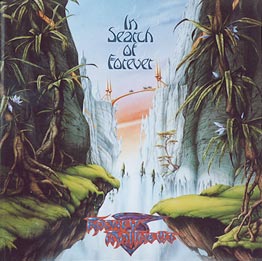
You do not exactly read a book of illustrations but this one is a little different since it has extensive and thorough descriptions from the person resposible for tons of stuff that I loved as a kid such as fantasy book covers and record covers. Bought this in a used book store in a magic place called Camden. What drew me to it was the fact that I always remembered the covers of “Praying mantis” records’ while at the same time do not remember their sound. Moorcock’s illustrations follow. Liked reading the stories behind magnificent 70s/80s stuff and will definitely be coming back every once in a while to check them out again.
Link: Author’s book page
05. The new Hardboiled Web Design - Andy Clarke
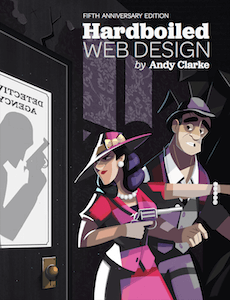
I decided that I wanted to update my HTML5 knowledge and get up to speed with the latest developments, mainly HTML5 and CSS3. Being aware of the remarkable quality of Smashing magazine’s printed material along with wanting to compensate them for all the great material that they produced, I bought it. It was not exactly what I was looking for, it was way way more!
Although what I needed was there, it was a very small subset of that the book is about. Andy Clarke takes though his methodology of web design. Instead of the now outdated “graceful degradation”, he suggest a “progressive enhancement” approach, allowing browsers who support novel features to do so, without breaking the experience for those who do not (yet). This allows to start from plain HTML and CSS and create stunning results without frameworks and almost from scratch. This is one element of the “hardboiled” that triggered a paradigm shift and provided lots of food for thought. There is a lot of other content and items covered, I really managed to learn how to align flexboxed content :-).
I would really want to use the hardboiled approach in a future project after finishing the book. Reading “Hardboiled” really made me wish I had more time in my hands to learn deeper and do more around web design, hope the opportunity will arise in the near future.
Link: Publisher’s book page
06. The broken sword - Poul Anderson
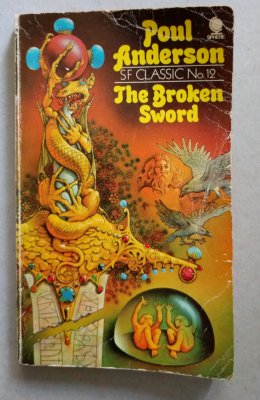
Second recommendation from Richard Morgan who brought the book to my radar. Mindblowing and amazing on how a person could put such a dense story in about 200 pages. Made me see norse/British mythology from a totally different angle. Trivia: The sword of the book is the inspiration for Moorcock’s Stormbringer. Page turner, necessary, wish was exposed to such master pieces earlier.
Also it seems that covers have deteriorated over the years. I bought a 70s paperback which has the wonderful cover as seen above while the contemporary one looks like an abstract nothingness… Why?
07. Mindset - Carol Dweck
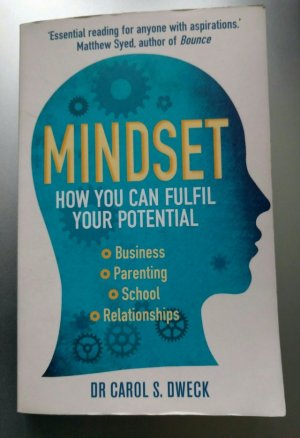
Being lazy, I will copy from author’s book page:
“Mindset is a simple idea discovered by world-renowned Stanford University psychologist Carol Dweck in decades of research on achievement and success—a simple idea that makes all the difference. In a fixed mindset, people believe their basic qualities, like their intelligence or talent, are simply fixed traits. They spend their time documenting their intelligence or talent instead of developing them. They also believe that talent alone creates success—without effort. They’re wrong.In a growth mindset, people believe that their most basic abilities can be developed through dedication and hard work—brains and talent are just the starting point. This view creates a love of learning and a resilience that is essential for great accomplishment. Virtually all great people have had these qualities.”
An anecdote about Mindset: I had to put into practice what I was reading while reading it. There was a tough situation where I had to choose between responding with a growth or with a fixed mindset. Growth won and honestly I am a different person ever since. Reading this book triggered one of the most intense “mirrors” effect that I had experienced in my whole life: What I was/am doing wrong because of having a fixed mindset, why and how to fix it - should there be the need to.
“Mindset” follows the classic pattern of modern self help/discovery books: theory in first 100 pages where a Harvard business review would stop and then applications of the theory into different areas. Again the reader should cherry pick, but I somehow managed to read it all again. Parenting was tough because it brought back painful memories of receiving fixed mindset parenting, will do better?
08. The functional art - Alberto Cairo
Part of my transition to / education on data science. Reflection and notes are being brewed into a separate post…
09. Extreme Ownership - Jocko Willink and Leif Babin
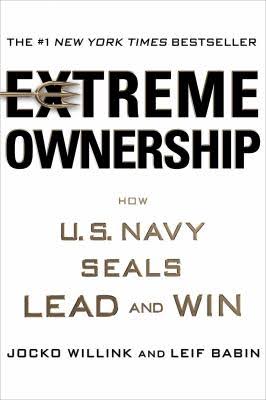
It was one of the few times that I bought the hard-cover version of the book as I usually prefer to wait for the paperback (less space, lower price). But somehow the hype around it made me want to read it as soon as possible. Ownership was a field that I had discovered I needed to work on more, as I had a tendency to over blame others or circumstance. Leaning towards “owning” it, I decided to get and read it.
The authors are both ex-Navy Seals with recent Iraq experience. There was a fear that their experiences would not translate to learnings and applications relevant to day to day life and contemporary businesses. Luckily it seems that this is not the case.
“Extreme Ownership” follows the same pattern in each chapter: Situation in Iraq related to each chapter, discussion on the related principle, followed by applications in the business world for each of the twelve leadership principles presented. Reading it made me understand leadership mistakes that I have made in the past, recognise others that my leaders had done as well as good decisions/leadership examples from me to others or other managers to me. The book is great, maybe not as well written in some places as the authors are not professional authors, but the content compensates something that also the various reviews conclude. I would definitely recommend it to anyone that wants to lead first himself and then others. I need to improve both, so there was lots of food for thought for me there as well as writing that would make me put the book down and reflect.
These are the 12 principles from the table of contents:
- Extreme Ownership
- No bad teams, Only bad leaders
- Believe
- Check the Ego
- Cover and move
- Simple
- Prioritise and execute
- Decentralised command
- Plan
- Leading up and down the chain of command
- Decisiveness amid Uncertainty
- Discipline equals freedom - the dichotomy of leadership
Although the book is a “tour de force” experience the last chapter “discipline equals freedom” is mind-blowing, still echoing in my head, backed up by strong arguments. So is the afterword: “leadership is simple but not easy”.
Personally I would like to ask the authors about when things are a little bit fuzzy in the business world, for actions that might get you in a court martial while in the military: “is there a case where we should ignore orders?”, “when should we leave the company we work for for another position?”, “Should I ever work for a competitor?”
Links:
- Amazon
- Goodreads
- Author’s book page on their consultant’s firm site.
10. Show Your Work! - Austin Kleon
Reread: Would need the material for some side activities so decided to get back to the basics.
11. Black Box Thinking: The Surprising Truth About Success - Matthew Sayed
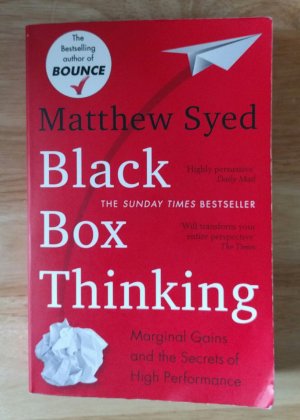
If we could conceptualise arguments as nails, then in “Black Box Thinking: The Surprising Truth About Success” Mathew Syed comes with a packet of nails, wields a hammer and nails his thesis in your head in a way that will stay there for ever. “Black box” is about learning from failure but unlike cliche-speak that the name would suggest this book has a journey on how we fail, why, how to learn, why some industries/companies do learn from their mistakes and they improve while others discard them and stay the same. Backed by author’s research, interviews, other material and also UK content which makes the examples more familiar. I started reading it in order to borrow-steal some ideas for my writings but at the end I read it top to bottom.
The difference with other books on the subject is that Mathew Syed gets you by the hand proving each argument with details while never being boring at the same time.
Being overwhelmed/lazy again, a paragraph form author’s site: “Learning from failure has the status of a cliché, but this book reveals the astonishing story behind the most powerful method of learning known to mankind, and reveals the arsenal of techniques wielded by some of the world’s most innovative organizations. Their lessons can be applied across every field – from sport to education, from business to health.”
Links:
12. Persian Fire - Tom Holland
Was always interested in ancient Persian history after reading about the Persian wars in antiquity: How did these people from so far away could assemble an army to invade Greece and how did they create their empire in the first place? Purchasing “Persian fire” after listening to Dan Carlin’s King of Kings - and King of Kings part 2, I was soon to find out. The book was not only about Persia as it is concentrated around the Persian wars as well with the difference of presenting both sides of the story as the historical narrative evolves.
Holland’s descriptions have the effect of making the reader (OK me) feeling like we were there, like almost smelling the sea of Ionia, looking around in the Streets of Babylon, or seeing as a satrap sends a letter to the great King in Persepolis. The story starts unlike other authors who begin with the Ionian revolution - the first contact of Persians with mainland Greece - with Assyria, then Babylon and so forth through Cyrus’s empire steady growth and the annexation of Lydia, which in turn triggered later on the Ionian revolution.
The book helped me revisit heroes of my youth such as Themistocles, answer many historical questions that I had from childhood as why did Macedonia submit to the Persians, and shred new light with more contemporary archaeological research on how ancient Greek society was structured, how were the armies organised and so forth.
Really enjoyed and recommend this one, next stop is either Holland’s “Millennium” or a follow up to Alexander the Great’s conquests.
Link: Author’s web page
13. The Truth - Neil Strauss
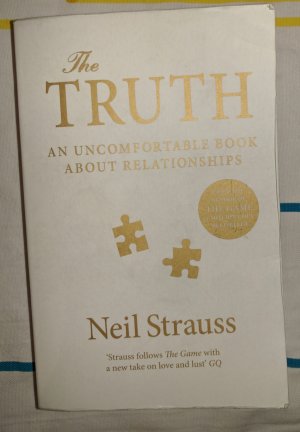
Was waiting to read the latest book of Neil Strauss after his interview on inside quest:
When I saw the following clip from another beloved channel, “fight mediocrity”, I just bought it and started consuming it.
The questions that I wanted to answer having seen the clips above were about what happens after “The Game”, how does a relationship with a single person evolve? Also how we can deal with our childhood traumas and baggage that we carry in general?
There are many answers, most of them personal, with “The truth” taking you through the author’s personal journey. Neil Strauss has his own balance between scientific research, literature, available knowledge corpus (what he’s read) melded with his own experiences and life choices (what he’s lived). So “The Truth” is very personal, very intense, has experiences that readers would not necessarily pursue (polyamory conferences, orgies), but on the same time learnings that each one can take and apply to their life: as in “The Game” but better :-). It’s not “investigative reporting” it would be more “self-investigative reporting”.
Links:
14. Ego is the Enemy - Ryan Holiday
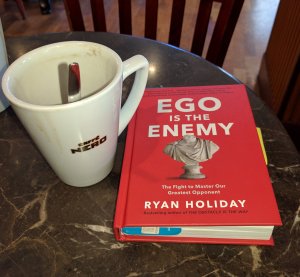
I wanted to read this book very fast because I had a short holiday on which I would try to time travel to ancient Rome, reading Tom Holland’s Rubicon, the next one on the list.
At some point I remembered being a kid and reading the famous Baudelaire’s poem, get drunk, quoting:
“Time to get drunk! Don’t be martyred slaves of Time, Get drunk! Stay drunk! On wine, virtue, poetry, whatever!”
Back then when I read it, I treated it as a good rhyme for a poem, with Holiday’s book it happened to me. I knew from the first pages that I would read it again and again and again, so I had a fast fist time as soon as possible. I think “Ego” is a modern classic, I liked the contemporary examples used referencing heavy metal personalities as positive or negative examples. Definitely recommended and goes very well with his previous “The obstacle is the way”. Thoughts are a little bit random, currently not able to put them in place. Ah, what the book is about (Fight Mediocrity video):
About the book, from publisher:
As in The Obstacle is the Way, Ryan Holiday delivers practical and inspiring philosophy, this time exploring a powerful concept that runs back centuries, across borders and schools of thought: ego.Ego is our biggest enemy. Early in our careers, it can prevent us from learning and developing our talents. When we taste success, ego can blind us to our own faults, alienate us from others and lead to our downfall. In failure, ego is devastating and makes recovery all the more difficult. It is only by identifying our ego, speaking to its desires, and systematically disarming it that we can create our best work.Organised into bite-sized observations featuring characters and narratives that illustrate themes and life lessons designed to resonate, uplift and inspire, Ego is the Enemy shows how you can be humble in your aspirations, gracious in your success and resilient in your failures. It is an inspiring and timely reminder that humility and confidence are still our greatest friends when confronting the challenges of a culture which tends to fan the flames of ego and encourage the cult of personality at all costs.
Links:
15. Rubicon - Tom Holland
![]()
Had some holiday time that I had to spend at home and decided to spend it some of it checking out ancient Rome. Got interested from podcasts in hardcore history plus the capability of Holland to build a narrative and flow. I had - still have - a problem with Roman names, so if there would be an author that would help me make sense out of it, it must be him.
“Rubicon” is centred around the crossing of Rubicon by Julius Caesar describing the events before that as well as immediate afterwards. What we see is the rise of a superpower which the bigger it becomes the more it corrupts and destroys its institutions. At the end, as it is well known, Caesar gives the final blow to the body of the Republic by becoming dictator.
Holland can take you there, use the different historical details and sources to paint a picture in a flow that is easy and compelling to follow. As in “Persian Fire” which I read some months before, with Rubicon you walk in the Colloseum, debate in the Forum, go for voting in the fields or Mars. You also get to know the Gauls, the Parthians, what was going on in Greece, empress Cleopatra, and also how alien Britania was back then. The lessons from this book and their application to modern politics is at least striking - people never learn.
Recently a friend asked me why I am interested so much specifically in ancient history: it is because people do the same mistakes over and over again, so by studying one specific period you get the same insights as in any other. In antiquity there was less technology, so it is easier to follow and see the characters, and also being Greek meant something considerably more than being one later on :-).
16. Empire V - Victor Pelevin
I came across Pelevin’s book when I had to find shelter in a book-store from an unexpected English summer rain. I really liked the plot in the back as well as the cover to be honest. “Empire V” is a humoristic story with vampire surroundings. Our hero wakes up chained in a room where he is told that he will soon become a vampire and his induction courses will soon begin. What we learn in the induction is that vampires rule the world as well as how they do so without anyone noticing. The whole book is a satire of modern living with all errs of modern society originating from those vampires so that we mortals will not be able to see the truth.
“Empire V” is a very comfortable read with very good flow full with bitter humour and dry jokes. I really enjoyed reading it while commuting on the tube which sometimes triggered outbursts of laughing that amused the other passengers. The metaphysical element is used as a layer to add mystery and grandiose in the mix; as I understood from reading author’s interviews it could have been as well something else.
After finishing it, it was a good one that provided me entertainment in a period of life that I really needed it. It will not change my relationship with literature not it is one of the you have to read them books. I had to stop reading while I was in the last twenty pages in order to get out of the tube close to home. In some others book I would definitely read them the same evening. With this one, I just waited for the next day to get my humour fix. Which brings us to the last comment about the plot: it is not a bad book by any means, just too linear, but a good read nevertheless.
17. Asterix and the Missing Scroll - R. Goscinny, A. Uderzo
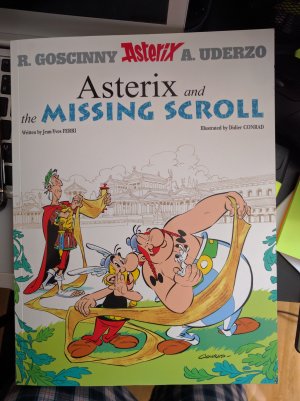
Usually do not write about graphic novels, but there is always room for an exception. Reading this was a trip down to the memory lane since I used to read Asterix as a kid, teenager, early 20s - essentially until I read all the material available back then. I had a flyer / postcard from when it was released back in October 2015 which was waiting in my to-read list, well it’s time was due.
The humour is essentially the same, the Romans around the Gaul village, Julius Caesar, and of course our lovely Gauls. In this instalment Caesar is publishing probably “Commentarii de Bello Gallico” when his editor suggest to leave out the chapter about that small village out so that the readers will assume that he has conquered all of Gaul. As anyone would guess, someone steals the papyrus and finds refuge in that small village. Editor’s only hope is to try to retrieve it. Similar narrative with previous ones, but here there are some twists which I’ll leave for those that want to indulge. A modern addition are many references to modern Internet and social media in general. There is a network of message dispatching pigeons for example, or some birds that tweet.
Reading it twice as writing this to stroll modern France with Asterix and Obelix once more.

Link: Official site
18. The Machinery of Freedom - David Friedman
This was the first time that I really decided to read large parts of a book and not the whole thing from cover to cover. While reading I realised that it would be very difficult to read something when you totally agree with everything the author says.
Friedman here discusses the principles of anarcho-capitalism, why it should be implemented, and also how. It compares how state handles situations versus the free market (lets say actually free or unregulated market). One interesting piece is when he discusses, back in the 60s, on why and how space exploration should be conducted from businesses not states. In a world of Elon Musk and Jeff Bezos this seems self evident, arguing this with very solid arguments among a hippie infestation would be a totally different thing. For essays that were written back then, there is a short paragraph at the end commenting on what has happened in between.
Some parts of the book are about the differences of anarcho-capitalism and libertarianism, or no stave against small state. Although useful, in a time when we are full of communists or crypto-communists (socialists) and mega-soviet structures such as EU, this argument seems more like a luxury, hence these are the parts of the book I skipped.
A little bit obscure and niche reading, but nevertheless enjoyed it.
19. Conan the Victorious - Robert Jordan
Back to a childhood’s favourite. Was between projects/books/stages in life when I came across this book sitting in the fiction section of a department of a bookstore/media chain in Athens Public. Hadn’t read any Conan novel from anyone except Robert E. Howard this was the first. Very nice trip to the Hyborian era and its eastern Kingdoms. Robert Jordan who has a spectacular CV and number of books published did a nice job here which gave me a nice weekly reading break and another Conan item for my always expanding collection.
Conan is minding his own business as a local thief in Turanian’s Sultanapoor until he gets in to a nasty bar-fight which ends up killing a foreign official. This will lead him to a series of events that will get him to the far eastern Vendhya. Magicians, swords, near and far eastern scenery, as well as “lovely” women such as women of the court and working girls of the era. Not the best thing I’ve read about my lovely Cimmerian (I’ve skimmed another Conan book from the same author and it seemed better), but a nice story for a reading break.
20. Woken Furies - Richard Morgan
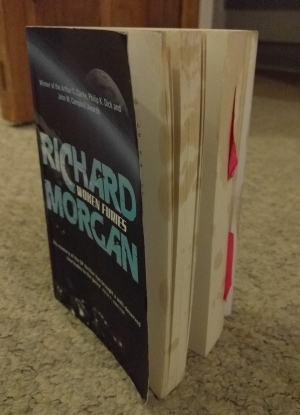
Richard Morgan is the same author whose works give me almost the same feeling with William Gibson: whenever I read his books for the first time, I get next to nothing of what’s going on and how while also I cannot stop myself from reading them. At the end of the journey there is that dreaded sense of loss which again no other author than these two can produce, at least within works of fiction.
In addition to the above, Woken Furies was simply huge. I have a personal rule, which I call rule of 300 - no more than 300 pages are allowed for a fiction title. Maybe this is because I cannot easily remember names of people and locations nor easily visualise what is going on up to an extent. “Woken Furies” doubles this. So for 3 to 5 months on and off I managed to read it, grokking more than what I did while reading it’s predecessor “Broken Angels” in the process, coincidentally this year started with reading that for the second time making it the most Kovacs year ever, finishing with visiting Kovacs’ home-world Harlan with its archipelago, alien artefacts, and human inhabitants.
At the end that sense of loss from having to end that trip to that distant dystopia still persists knowing that I will get back for one more read in a few years down the road, even if just a couple of hours before finishing it I managed to spill a cup of coffee on the book giving it a unique decoration. Next step: Revisit William Gibson’s Neuromancer.
PS: One might notice that I have not discussed the plot, really would like you to read it! PS2: Always wondering how many people that started with “Altered Carbon” ended up reading “Woken Furies”? Why? Why not?
Links:
21. Homo Deus - Yuval Noah Harari
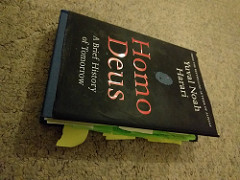
Book was a gift. Generally I refrain from reading books that talk about the future, since everyone can say anything and not be blamed if their predictions end up being wrong. Harari though had a good credit record from his previous “Sapient” which I have not read.
Now on “Homo Deus”, it is mind-blowing. Humanity: how we got there, why? How do we see ourselves? What are the religious and scientific paradigms. We are now on the verge of tipping to the next level, will that be “Homo Deus” or the total control of “Data Religion” or I am writing this list for the whole of 2016 because I want a better Dimitry and improve/communicate my readers or because I believe that “I produce data therefore I am” - and also consume - so I want to produce as much text as possible?
Very convincing, with good examples documenting his thesis on each subject in a very nice and concrete pace. Added post-its for the areas that I will re-read/take notes.
Books not read
A brief history of seven killings - Marlon James
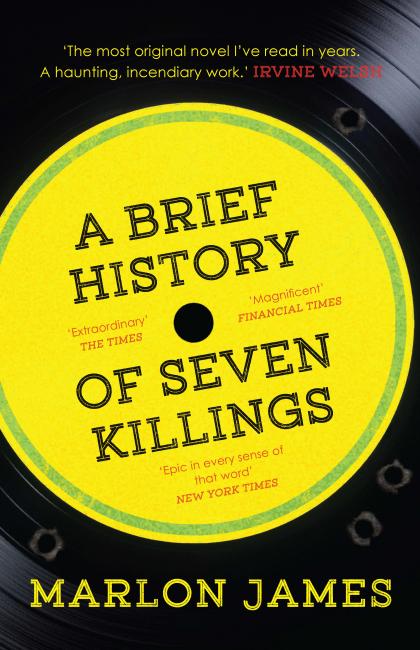
*Decided to check out this book after an endorsement from Richard Morgan:
Fuck me - only 8 pages into @MarlonJames5 Brief History and I'm trembling with the force of it; not read anything this intense in YEARS!
— Richard Morgan (@quellist1) 23 January 2016
I am sure that in some years from now we will have people whose “best” books will be: Takeshi Kovacs trilogy, “Neuromancer”, “A brief history…” and people will wander how cyberpunk and Jamaica mix. Remember you read it first from me!
The other two factors that brought me to Foyle’s looking for it was first realising that I knew nothing abour Jamaica, apart from Red Stripe, that girl rubbing against me on the Portobello carnival and a couple of people I know that are second generation though. The second reason was the interviews and discussions of the author on YouTube.
Dropped it in the middle, could not digest it. The trip up to then was ver fast, very condensed, very brutal, very honest, very everything.
What makes it special: Patwa/Patois the local Jamaican dialect. Each chapter is from the point of view of each book’s character. The local drug enforcer thinks with the local dialect a lot and his mind is messed up, another girl thinks locally but her thoughts are clear, a CIA opeative speaks conventional English and so on.
A very interesting device is the utilisation of cyclical story telling, which is the way Jamaican story telling works (got this from the YouTube interview), so is the narration. Totally unconventional but interleaved with the thought patterns of the characters. So strong that decided to utilise it for some of my blog writing.
Why I couldn’t finish it: Read the first part which is set in 1976 and the beginning of the second set in 1976. From there I just could not push further. Guess I got too much of an intake. Since . Also I cannot easily remember names, I started losing the plot. Last I have a roughly 300 pages rule for a fiction books, this one is about 700 pages. After some time I had some fatigue, wanted to get back to reading something non-fiction. So decided that it would be best to stop and come back at some point in the future, something that was also the approach that some people on Goodreads took as well. Then I will also try to read summaries and material on the people and the places to get a grip on the parts of the plot that slipped.
From the reader’s perspective, I still have not managed to scan books and only concentrate on the interesting parts for me. There is still the read from cover to cover mentality which I haven’t let go. Maybe this book is not a proper candidate for a start though…
Blockchain Revolution - Don Tapscott, Alex Tapscott
Used rule 50 and decided to drop it, apart from reading random pages, keeping a copy of the table of contents, and some notes here and there. Too much discussion about hype, no simplified mathematics or something similar which would help me understand how this blockchain thing “works”. More like it is here it will change our lives verything is awesome - Hooray type of stuff.
Mayne the author has done a good work and I missed it. I would prefer to start with a blockchain appication, explain how it works and then follow up with how this changes the way business is conducted, business culture, etc. Or later on how the initial chain would compare with others, say Bitcoin vs Ethereum. Maybe not for me.
Goodreads link: https://www.goodreads.com/book/show/25894041-blockchain-revolution.